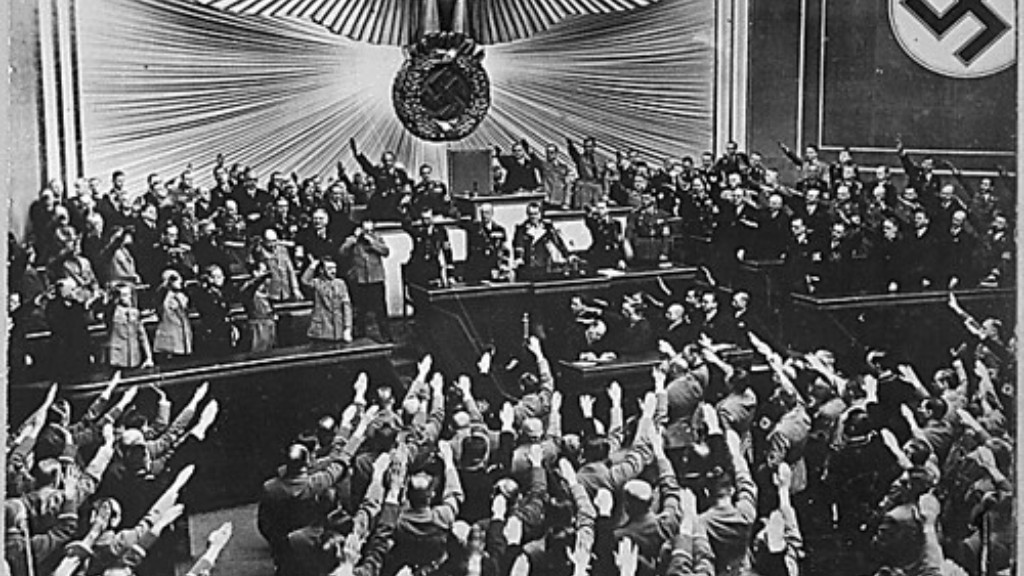Background of Hitler’s Work and Writings
Adolf Hitler, who served as the chancellor of Nazi Germany, was a controversial and divisive figure in world history. He wrote the political treatise, Mein Kampf, while imprisoned after the failed Beer Hall Putsch of 1923. Despite its association with Hitler, Mein Kampf is nevertheless an important primary source for understanding Nazi ideology and Hitler’s thought process. Hitler wrote the book to spread his political ideals and expand his dictatorial power in Nazi Germany.
Mein Kampf, which literally translates to “My Struggle” in English, contains two volumes and was written in 1924. Hitler wrote the entire book himself while he was in prison, and it was first published in 1925. He combined his personal experiences and beliefs, along with his political ideas, to illustrate how Germans could use racial hatred and antisemitism to gain power and control.
Hitler’s Intent with the Book
Mein Kampf was written for a number of reasons. Hitler wanted to create a new German identity, to respond to the harsh reparations and sanctions imposed on Germany after World War I, and to show how Jews could be targeted. The book reflects his rage and frustration against the “Jewish-Bolshevist” government, and how he sought to bring Germany out of its economic and political distress.
Hitler’s aim was to gain popular support by appealing to the grievances of the German people, and to convince them that his ideology was the right path. He also wrote Mein Kampf in order to gain legitimacy and consolidate power by becoming an author. Mein Kampf was a tool designed to be persuasive and to convince German citizens to follow a fascist and nationalist path.
Reception of the Book
Mein Kampf was widely read in Nazi Germany, and both volumes of the book together sold more than 10 million copies. When the book was published, it was viewed as an interesting and informative political treatise and many German citizens thought positively of Hitler’s anti-Soviet stance.
However, when Hitler rose to power, the book was widely condemned and criticized by the international community, with many denouncing its hateful rhetoric and genocidal views. In 1945, the Allies prohibited the publication of Mein Kampf and it was banned in many countries.
Analysis of Mein Kampf
Mein Kampf represents a unique historical document that provides insight into Hitler’s views and beliefs. The book offers an analysis of Hitler’s own political views, and of the changing political conditions of Germany at the time.
Mein Kampf can be seen to contain aspects of both racism and nationalism. Hitler believed that all German citizens should have equal rights and should work together to achieve a shared vision of nationhood. However, he also viewed non-Germans as inferior and sought to limit their rights and civil liberties.
Mein Kampf in the Modern Context
The most famous example of hate speech in modern times, Mein Kampf has become associated with Nazism and racism. Despite its questionable content, the book is still a key part of the historical record.
Today, opinions of Mein Kampf range from condemnation to justification. Some view Mein Kampf as a raw expression of Hitler’s inner world, whereas others believe it should be publicly available for the purpose of honest historical research.
In Germany, the book’s copyright will expire in 2016, after which it can be published and redistributed in its original form. This will make it easier for scholars to research Nazi ideology and gain a better understanding of how Hitler’s ideas took shape.
Mein Kampf as a Primary Source of Argument
Mein Kampf is an important primary source of argument and analysis, and can be used to study the political context of Nazi Germany. Among historians and academics, Hitler’s book is used to gain insight into the political system and the ease with which fascism took control.
A critical reading of Mein Kampf brings to light the rhetoric used by Hitler and how it appealed to the German people. This can be helpful in understanding how to detect and counter similar ideologies in the future. For example, some have pointed to strong similarities between Hitler’s rhetoric and the current rhetoric of certain extremist political leaders.
Mein Kampf and its Relevance to World History
Mein Kampf is one of the most influential documents of the 20th century, and it has shaped the way we think of modern history. By examining the text and analyzing its content, it is possible to gain an understanding of how Hitler wielded his power and calculated his decisions.
The modern relevance of Mein Kampf can be seen in the way its ideas are used to inform the actions of modern political movements and ideologies. Though the book itself is disdained by many, it remains an important source of understanding and a reminder of the horrors of Nazism.
Influence of Mein Kampf in World Religion
Hitler’s book has had a long history of influence in world religion. It has been used to support anti-Semitic, anti-Christian and anti-Asian thought. It has been used by some clergymen to preach hatred and violence, and it has been used by some extremist Muslim sects to “justify” their beliefs.
Moreover, Mein Kampf has been used in some parts of the Islamic world to increase support for radical Islamic groups, and it has been connected with a variety of terrorist networks. For some, it is seen as a symbol of religious extremism and hatred, while for others it is seen as a source of inspiration.
Impact of Mein Kampf in Intellectual Movements
The impact of Mein Kampf in intellectual movements has been far-reaching. Though some use its ideas to spread racism and fascism, others have used the book to learn more about the ideology of fascism and to understand its historical and political implications.
Mein Kampf has been studied in various academic fields, including history, political science, and sociology. It has also been used to analyze the social and political implications of modern fascism and to understand how political ideas can be used to manipulate people and gain power.
Mein Kampf and its Impact on Modern Media
Like other controversial items, Mein Kampf has been used to create buzz and controversy in the modern media landscape. It has been used to spark debates about morality and ethics, to highlight the dangers of extremism and to discuss the complex nature of political power.
Mein Kampf has been the focus of many movies and TV shows, and it has been examined in countless books, articles, and academic papers. In this way, it continues to be an important source of education and discussion, and a reminder of the danger of fanaticism and extremism.


